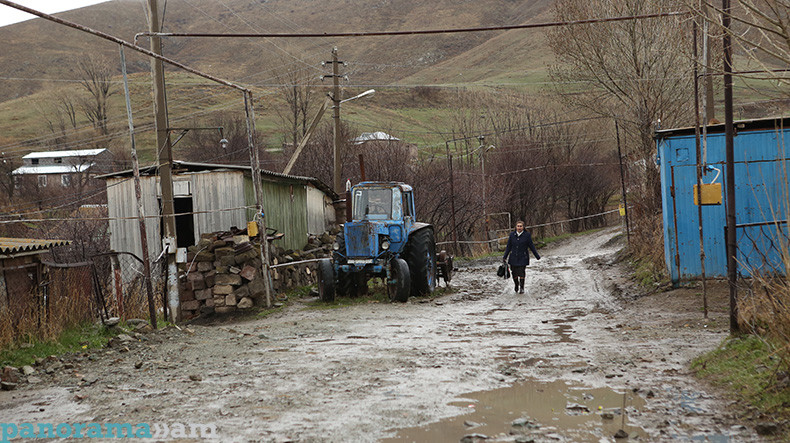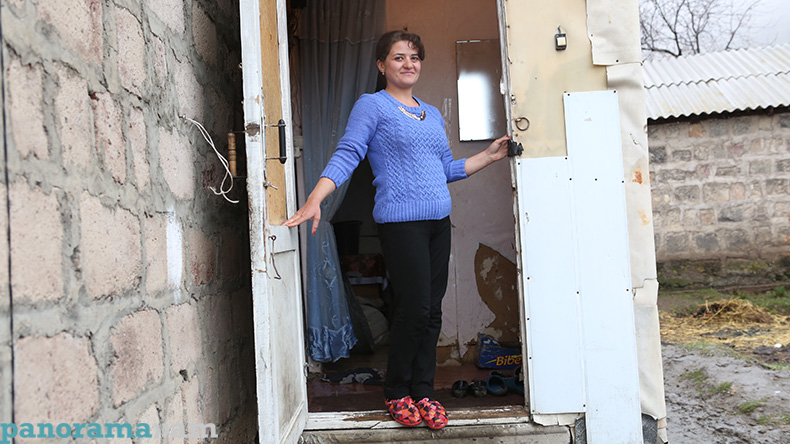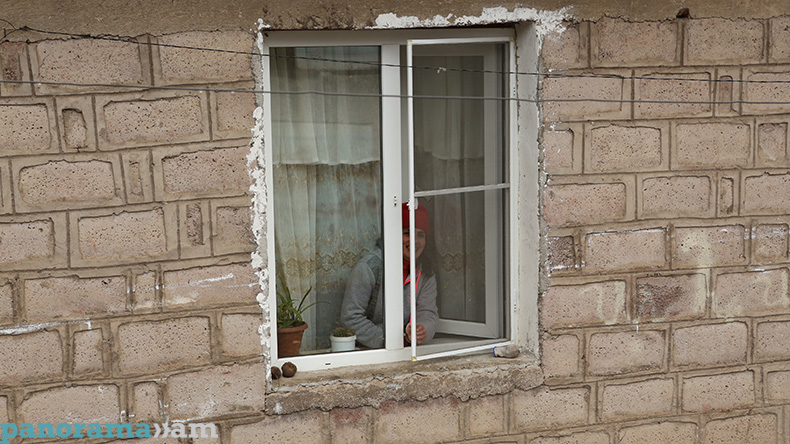
Geghasar housewives, tractors and idlers
Stories of four women from Geghasar village of northern Armenia
Armine
.jpg)
“I am the housewife and this is my husband, Armen, my mother-in law is right there speaking to your friends. She was the one who liked me first. I was travelling by train with my father when I met my future mother-in law. We sat next to her and chatted all the way. I wore a long dress and used to keep long hair. I have never wore trousers, and never cut my hair, never groomed brows as I prefer everything natural. She liked me, said she had a son soon to be married, asked about the place of my living, yet didn’t voice about her intention. One day, somebody knocked on our door, and as it turned out the guests arrived for the purpose of matchmaking. My mother opposed first then changed her mind. I fell into love. As there were no other guys in the village, I thought he was my fate. It happened 16 years ago. My twin daughters will turn 16 soon. One thing I know for certain is marriage will come sooner or later yet daughters should study, graduate, find a job first. This little boy is my son Karen. He is straight-A student at school. I wish he becomes a doctor to cure his mom. I have goiter and leg pain,” Armine shared some of her worries, including the fact she lived with husband and her three children in a shack.
She next told that the adjacent land was cultivated by her and daughters. There are not engaged with cattle breeding due to absence of a cattle shed. Her husband does not leave for migrant work yet has no permanent job. Asked how they live, she replied: “Somehow,” taking out the baked bread from the smoldering oven and offering us.
The family receives state subsidy which however doesn’t cover all the expenses. They have no choice of moving from the shack. They received a house where the family of her husband lives and they moved to another place. Having own land, they are unable to cultivate as it is far.
The head of the community Varazdat Grigoryan says earlier the problem was not the case as Soviet collective farms and tractor parks operated throughout the village. In these days the land is cultivated by individuals while the agricultural machinery belongs to the private sector the individual farmers are often unable to agree with over the renting price.
As a result of the fact the lands are not cultivated, the people are left to poverty and jobless. Some 700 people reside in Geghasar village, while the total number of residents according to the registrar book is 932. 69 students are enrolled in the local school with five first-graders. There is no kindergarten. Over the past two years, couple of enterprises were established specialized in milk processing and stone production. 90 per cent of the male population of the village leave for other countries for employment. The total budget of the village is 21 million AMD, (around 44,000 USD) 15.7million of which is a state allocation, the rest is from local taxes. Women are the only labor force in summers and ….the tractors.
“They are lazy. A villager can make his bread if they work. That is the main difficulty as people have become lazier,” former village mayor says,
I wonder who have become lazier – the men who leave for other countries in search of jobs, their old parents, wives and children or villagers do not want to run a village lifestyle anymore? The state subsidies and the Remittances from migrants have made the residents of the village to leave their daily rhythm and abandon the land. Couples are leaving for abroad in searches of jobs and the children, elderly and housewives are the only ones to stay and act as workforce.
Arpine

“ When it comes to haying, no difference between men and women. We are doing everything for our husbands. From early morning we milk cows, take care around the herd, do the chores, cultivate the land. In the evenings we help children with classes and other home duties. That is perhaps the reason we have no places of entertainment in the village as everyone gets tired after the long the volume of work we do every day. If we are called lazy then, I have no comment. Let them calls us idlers,” Arpine, another housewife expecting a baby, told us.
I couldn’t resist to ask whether they are not offended when husbands leave them. “Is getting offended a way out? How will we live in winter? The life in the villages are hard,” noted Arpine.
Arpine’s husband, Hovhannes shares with his upcoming plans to leave for abroad work and wanted like to take Arpine with him. However, living conditions when around 30-40 men live in one apartment do not allow him to take her. In his words, he could stay in the motherland if could find a job with a salary of 150 thousand AMD (around 350 USD). Asked about homesickness, they both smiled: “We will try to go without it.”
Anahit
.jpg)
“All the stories you learn from our fellow villagers should be multiplied by two in order to understand the hardships single mothers and divorced women face here. I was 4 when my father died. I wasn’t quite good at studying and have neither specialization nor a job. I have a daughter who is luckless for a having a mother like me. I have no idea what next the destiny has prepared form me as I can no longer afford looking for help from my mother and brother. Every time my child comes home telling stories about classmates buying or having this or that. I do not want her to feel disadvantaged. Neither blame on her father. His parents shouldn’t have married him knowing about his mental illness. I lived as a prisoner for eight years in their house and then fled to finally get rid of them. There are no stores either in the village to go and ask for a job. The service is the only sector I can look into and find a job. I simply tant to work and bring up my child with still no idea about the future coming,” Anahit, the third woman we met in the village, desperately shared her daily hardships and wiped tears as the daughter approached.
The only way out for Anahit is leaving the village, finding an apartment and job in a town for proper living.
After talking to other villagers, I got why the village mayor who had governed for 18 years was constantly saying in Russian”. ”My goddess, where am I getting into?”
Some anonymous interlocutors complained about the state subsidies. “The subsidies provided to families in need are eliminated. No one complains about that out of fear they will be deprived of that small assistance should they voice the problem. The amounts are sent from the Central Bank to the Governor’s Office and when people go to receive their monthly assistance, they discovered marks “NP - Not Pay” in front of their names in the lists. People are poor but there is always a reason to say they are not in need. The most ridiculous and equally hard is when you think who get those amounts. The change of power is another problem as previously we could solve the matter through doing a favor to someone, while today they neither take money, nor do anything.”
Varsik

“My husband has not left for abroad employment for 8 years. In the early period of our marriage I was dreaming he stayed with me but not at the expense of what we have now. He got disability with a head trauma. Wherever we applied for discounts for the medicine he needs we are rejected. We pay for medicine around 40 thousand AMD (around 90 USD) monthly, while the state subsidy comprises 35 thousand AMD and the pensions is 25 thousand. If we do not receive assistance from parents, the amount will not suffice to pay even for the utility services. The state should have provided the medicine,” Varsik, the fourth woman we met told us her story.
“Needless to speak of that, I am the pensioner and the one you takes the medicine. That is our personal matter,” Varsik’s husband interrupted the wife, turned to me and said: “If you are going to raise our voice, please, write about the water issue. The situations is really troublesome with both the irrigation and drinking water. Three rivers are flowing through Lori region, and so why do we have this issue with the water? We even pay more for the water then the nearby villages. Authorities collect taxes from whatever they want – land, mountain, stone, let them repair the roads, do something for this village.”
I asked whether they plan to leave the village. The response was” “No, dear, we can’t leave this village, and the country alike for now at least. We have two boys who should go to army We have a debt to the motherland. We simply want them to pay more attention to the village, as we want to live a normal life,” Varsik said.
Speaking of the village streets, the mayor said: “The government allocated 6 million AMD last year to repair the roads. The only solution seems is the asphalt and we try to somehow solve the matter.” In his words, the issue of the drinking water is a priority which has not been addressed for years. Additionally, the lack of irrigation water damages the village as a result of which large portions of lands are not cultivated. The village is not involved in any state programme due to lack of available funds, yet the repair of the water pipe and the main road leading to the village are to be repaired. The total cost of the project is 25 million with two million to be provided from the village budget,” the village mayor explained.
As to the increased price for the water, Varazdat Grigoryan said unlike other villages they use water from a pumping station with the service including the electricity cost. They use only 30 per cent of the available water resources. The whole village is waiting for the reconstruction of the supply system.
As to us, we are looking for the Government to present meaningful strategy for the development of the villages likewise the residents to realize what is expected from them as no one will gift a better life to them unless they make the first step toward it, accept that miracles do not happen in a short period. Tomorrow’s better life is created through a meaningful and right work being done today. The reason for poverty may indeed lie in people’s heads and explained by the fact that villagers are gradually distancing themselves from daily works and live with hopes for a state support. The same, however, is not true with all-around poverty which comes to be a sign of a system problem. Systems should be changed, and the matter here is not about individuals either at the top or at the bottom.

.jpg)






.jpg)

.jpg)
.jpg)
Newsfeed
Videos






























